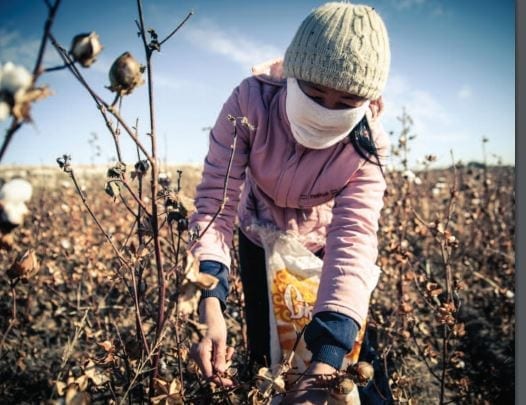
Jun 28, 2017
The World Bank is funding half a billion dollars in agricultural projects linked to forced and child labor in Uzbekistan, said Human Rights Watch (HRW) and the Uzbek-German Forum for Human Rights (UGF) in a report released today.
Even though the Uzbek government promised the Bank that it would not use forced or child labor linked to the projects or within project areas, and the Bank promised to independently monitor for abuses and create a way for victims to seek redress, in 2015 and 2016 forced labor continued. Under the loan agreements, the Uzbek government is required to comply with laws prohibiting forced and child labor, and the World Bank can suspend the loans if there is credible evidence of violations.
“The World Bank is giving Uzbekistan cover for an abusive labor system in its cotton industry,” said Umida Niyazova, director of the Uzbek-German Forum for Human Rights.
“‘We Can’t Refuse to Pick Cotton’: Forced and Child Labor Linked to World Bank Group Investments in Uzbekistan” details how the Uzbek government forced students, teachers, medical workers, other government employees, private-sector employees, and sometimes children to harvest cotton in 2015 and 2016, as well as to weed the fields and plant cotton in the spring of 2016. An estimated 1 million doctors, teachers, nurses and others are forced by the state to harvest cotton each year in the fall.
The report—based on hundreds of interviews and conversations with victims of forced and child labor, farmers, and key actors in the forced labor system, leaked government documents, and statements by government officials—shows that citizens continued to work in the cotton fields because of government threats of violence, firing, stopping welfare payments and the suspension or expulsion of students.
District Mayor Uktam Kurbanov reportedly said to one picker at a cotton meeting in Khazarasp, Khorezm region on September 29, 2015: “What’s this? You delivered only 1,286 kilograms? Why is that? I’ll tear your head off!”
Said a school director in the Fergana region on September 29, 2016: “I won’t call the complaint line number we were given. There is no use… All these calls [to the hotlines] will result in simple teachers and medical workers losing their jobs.”
Uzbekistan is the fifth largest cotton producer in the world. The country’s cotton industry generates more than $1 billion in annual revenue, or about a quarter of the country’s gross domestic product (GDP).
The UGF and HRW are members of the Cotton Campaign, as is the Solidarity Center. The campaign works to end the injustice of forced labor in cotton harvesting in Uzbekistan and Turkmenistan.
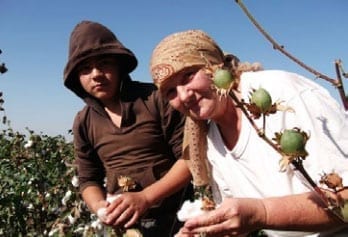
Mar 24, 2017
Uzbek human rights defender Elena Urlaeva was released from a psychiatric hospital in Tashkent yesterday where she was imprisoned for 23 days with neither her consent nor a court order to forcibly treat her, according to the Cotton Campaign. Urlaeva’s release follows an international campaign spearheaded by the Cotton Campaign, a global coalition of labor, human rights, investor and business organizations that includes the Solidarity Center.
Urlaeva was detained and beaten by Uzbekistan police the day before she was due to meet with representatives from the International Labor Organization (ILO), International Trade Union Confederation (ITUC) and the World Bank to discuss state-led forced labor in Uzbekistan.
Urlaeva Repeatedly Detained for Documenting Forced Labor
Urlaeva has documented forced labor in Uzbekistan’s cotton fields for the past 16 years, and has repeatedly been arrested, beaten and imprisoned by Uzbek officials. Last year, she was imprisoned in a psychiatric hospital for more than a month and arrested five times as she spoke with people forced by the government to labor in the country’s cotton fields. She was physically assaulted during the subsequent interrogation. In 2015, Urlaeva was arrested, beaten and forced to injest sedatives, and police confiscated her camera, notebook and information sheet on ILO labor rights conventions.
“A number of times I was put into a psychiatry ward,” says Urlaeva in a video released last November. “They did their best to show to the international community that human rights activists are crazy and they should not be listened to.”
Child Labor Growing in Uzbekistan Cotton Fields
Each fall harvest, some 1 million teachers, medical professionals and others are forced to toil in Uzbekistan’s cotton fields. If they do not participate, they must pay for a replacement worker or lose their jobs. Children also are forced to pick cotton, according to a preliminarily report by the Uzbek-German Forum, reversing a move away from use of child labor in 2013 and 2014.
Uzbekistan, which gets an estimated $1 billion per year in revenue from cotton sales, faced high penalties from the World Bank and other financial institutions for not ending the practice. Rather than change, the government seeks to cover it up.
Urlaeva has been credited with helping significantly reduce child labor in cotton fields, and this year was among human rights defenders in Uzbekistan to receive the International Labor Rights Forum 2016 Labor Rights Defenders Award.
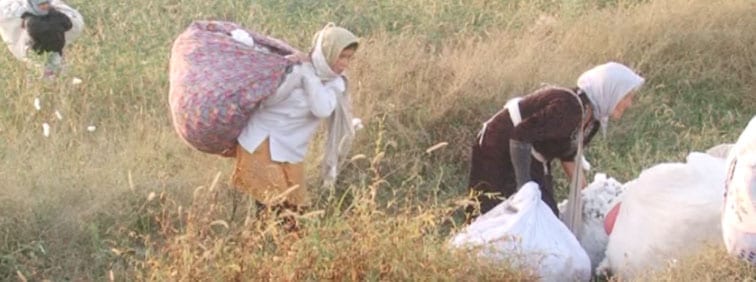
Sep 28, 2016
At least one person has died in Uzbekistan cotton fields so far this season, part of the country’s massive mobilization of compulsory labor in which nurses, teachers, students and state employees are forced from clinics and classrooms to toil for weeks picking cotton.
Komiljon Asimov, 20, a biology student at Abduhab State University, died September 11, days after university students were the first group mobilized by the Uzbek government for the fall cotton harvest. In another incident, Dilarom Juraev, 28, suffered a miscarriage in the fields.
Each harvest, Uzbekistan mobilizes more than 1 million residents to pick cotton through systematic coercion. From September through October, many classrooms shut down because teachers are among those forced to pick cotton. Health clinics and hospitals are unable to function fully with so many health care workers also toiling in the fields.
‘You Work Like a Slave from Morning to Night’
“Dinner takes place in the field again. For the dinner we are normally given watery soup,” writes one university economics student from the Andijan Agricultural Institute, who is now picking cotton. “I have no strength left. You work like a slave from morning till night, not enough food, and should sleep and wake up hungry again.”
The student, whose story was collected by the Uzbek-German Forum (UGF), describes being forced from her studies with other classmates to take part in the government-led mobilization. They are housed in a local school building emptied of students, where they sleep on a cold floor, with no showers and limited sanitary facilities.
The student says she spent hundreds of dollars of her family’s money buying food and warm clothing to prepare for working some two months in the cotton fields. Nearly 10,000 students from the four universities in the Andijan region were forcibly sent to work starting September 8.
Uzbeks Coerced into Signing ‘Voluntary Participation’ Letters
Last year, the government went to extreme measures—including jailing and physically abusing researchers independently monitoring the process—to cover up its actions. This year, the tactic appears to be widespread coercion of students, health care workers and others to sign letters indicating they are “voluntarily” participating in the cotton harvest, according to UGF. Employees are told they will lose their jobs and students threatened that they will be expelled from the university if they do not pick cotton or agree to gathering a set weight of cotton each day.
In one video, Alia Madalieva, the head nurse at Clinic No. 8 in Kokand City, dictates to employees the text for their “letter of commitment.” Seated next to a clinic employee in the cotton fields, she dictates: “If I do not collect 50 kg (kilograms) of cotton a day, I will voluntarily hand in my letter of resignation. I wrote this on my own.”
Uzbekistan and Turkmenistan, another country where forced labor in cotton harvests is rampant, this year were downgraded to the lowest ranking in the U.S. State Department’s 2016 Trafficking in Persons Report. Uzbekistan, which gets an estimated $1 billion per year in revenue from cotton sales, also forces farmers to plant state-ordered acreage of cotton and wheat or face the loss of their land.
More personal stories from those forced to pick cotton and other documentation are available at UGF’s new microsite. The UGF is a member of the Cotton Campaign, as is the Solidarity Center, The campaign works to end the injustice of forced labor in cotton harvesting in Uzbekistan and Turkmenistan.
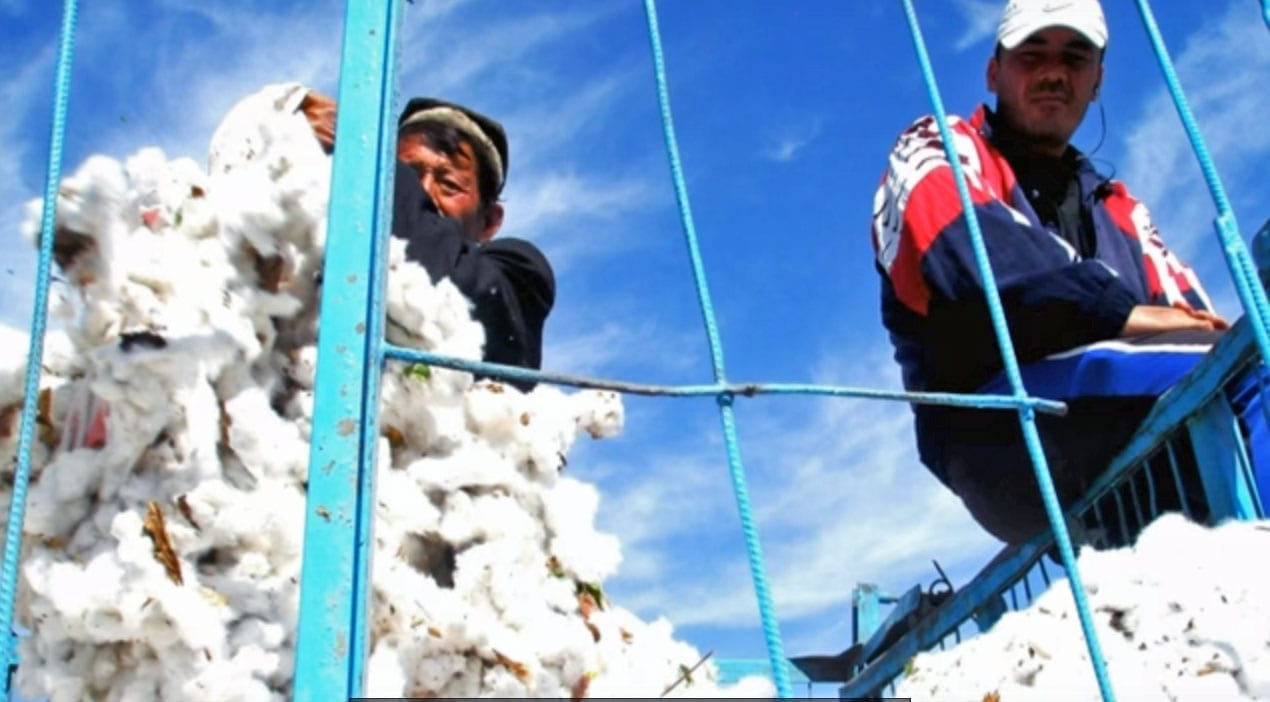
Aug 1, 2016
The World Bank must convey to the Uzbek government that attacks against independent monitors assessing the extent of forced labor in the country’s cotton harvest will not be tolerated. The World Bank must also outline consequences should the attacks continue, according to the Cotton Campaign.
In a July 29 letter to key World Bank officials, the Cotton Campaign, a coalition of dozens of labor and human rights groups that includes the Solidarity Center, wrote:
“The World Bank should take all reasonable measures to create an enabling environment for independent actors to monitor projects that it finances. We have not seen the bank take such measures in Uzbekistan.”
The World Bank Group is providing more than $500 million in financing to the government of Uzbekistan for its agriculture sector and additional financing to multinational companies processing forced-labor cotton in Uzbekistan.
1 Million in Forced Labor During Cotton Harvests
During each fall cotton harvest, the Uzbekistan government forces more than 1 million teachers, nurses and others to pick cotton for weeks, deeply cutting services at schools and medical facilities. Last fall, the government went to extreme measures—including jailing and physically abusing those independently monitoring the process—to cover up its actions.
“The Uzbek government’s repression of human rights monitors has made it impossible for essential mitigation measures of monitoring and grievance redress to function,” according to the coalition, which sent the letter in advance of an early August roundtable meeting of the World Bank, the Uzbek government, the International Labor Organization and diplomatic missions in Uzbekistan.
The coalition also is requesting that the World Bank “obtain an enforceable commitment from the Uzbek government to allow independent journalists, organizations and individuals to have access to all World Bank project-affected areas and to monitor, document and report about forced labor without interference or fear of reprisal.”
Uzbekistan Downgraded in US Trafficking in Persons Report
In June, an Uzbek victim of forced labor in cotton production and three human rights defenders filed a complaint against the World Bank’s private lending arm, the International Finance Corporation (IFC). They seek an investigation into forced labor connected to a $40 million loan to Indorama Kokand Textile, which operates in Uzbekistan. The complaint presents evidence that the loan to expand the company’s cotton manufacturing facilities in Uzbekistan allows it to profit from forced labor and sell illicit goods.
Also in June, Uzbekistan and Turkmenistan, where forced labor in cotton harvests also is rampant, were downgraded to the lowest ranking in the U.S. State Department’s 2016 Trafficking in Persons Report.
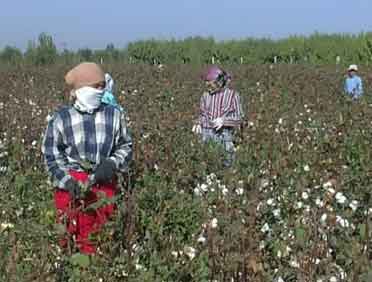
Jul 8, 2016
An Uzbek victim of forced labor in cotton production and three human rights defenders filed a complaint against the World Bank’s private lending arm, the International Finance Corporation (IFC), according to a coalition of human rights groups.
The June 30 complaint seeks an investigation into forced labor connected to a $40 million loan to Indorama Kokand Textile, which operates in Uzbekistan. The forced labor victim, who requested confidentiality, and the rights defenders Dmitry Tikhonov, Elena Urlaeva and a third who requested confidentiality, presented evidence that the loan to expand the company’s cotton manufacturing facilities in Uzbekistan allows it to profit from forced labor and sell illicit goods.
“The IFC should support sustainable rural development in Uzbekistan, not projects that perpetuate the government’s forced-labor system for cotton production,” says Tikhonov, who lives is in exile in France following possible retaliation—including the burning of his home—for his efforts to document forced labor in Uzbekistan.
“The ombudsman should investigate the IFC loan to Indorama, which we believe violates international law and the IFC’s own policies prohibiting forced labor.” The Cotton Campaign, the Uzbek-German Forum for Human Rights, the International Labor Rights Forum, and Human Rights Watch jointly announced the complaint.
1 Million in Forced Labor Each Year
Each year, the Uzbek government, which controls all of the country’s cotton production and sales, forces more than 1 million teachers, nurses and others to pick cotton for weeks. Last year, the government went to extreme measures—including jailing and physically abusing researchers independently monitoring the process—to cover up its actions.
Uzbekistan was downgraded to the lowest ranking in the U.S. State Department’s annual Trafficking in Persons report which was released last month.
The World Bank has invested more than $500 million in Uzbekistan’s agricultural sector. Following a complaint from Uzbek civil society, the bank attached loan covenants stipulating that the loans could be stopped and subject to repayment if forced or child labor was detected in project areas by monitors from the International Labor Organization (ILO), contracted by the World Bank to carry out labor monitoring during the harvest.
The World Bank approved the loan to Indorama in December 2015, despite an ILO report reaffirming the problem of forced labor.
In March, Cotton Campaign, a coalition of labor and human rights groups that includes the Solidarity Center, presented a petition signed by more than 140,000 people from around the world to World Bank President Dr. Jim Yong Kim, calling on the bank to suspend lending to the agriculture sector in Uzbekistan until the Uzbek government changes its policy of forced labor in the cotton industry.
Read the complaint here.





